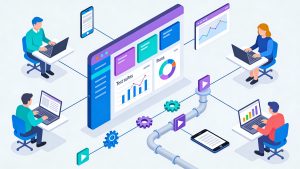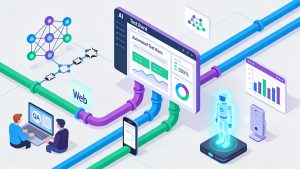The rapid rise of artificial intelligence (AI) is transforming industries at an unprecedented pace. From automating repetitive tasks to enhancing creative processes, AI tools are reshaping workflows across the tech landscape. While this evolution sparks excitement, it also raises concerns about job security and career sustainability.
However, the future of work isn’t about competing with machines—it’s about complementing them. By cultivating uniquely human skills, tech professionals can adapt and thrive in this AI-powered era. This article explores six essential skills that remain irreplaceable by AI and highlights their importance in shaping successful careers.
1. Problem-Solving
AI excels at executing specific tasks but struggles with complex problem-solving. Humans are indispensable for designing scalable systems, troubleshooting issues, and evaluating risks introduced by automation.
For example, while generative AI can produce code or monitor security anomalies, humans are needed to assess critical risks or resolve bugs that require nuanced understanding. Similarly, marketers rely on sentiment analysis tools but depend on human judgment to craft effective responses that protect brand integrity.
How to Cultivate Problem-Solving Skills
Problem-solving improves naturally through experience but can be developed intentionally through structured learning. Explore online courses or resources that teach systematic approaches to tackling challenges.
2. Critical Thinking
AI tools are limited by their training data and often generate biased or inaccurate outputs. Critical thinking enables professionals to evaluate these outputs, identify biases, and ensure ethical compliance in decision-making processes.
For instance, while AI detects patterns efficiently, humans interpret these patterns accurately and address anomalies that machines may overlook.
How to Enhance Critical Thinking
Critical thinking can be honed through formal education or self-directed learning. Platforms like LinkedIn Learning and Khan Academy offer courses tailored to improving analytical skills.
3. Collaboration
Collaboration is a uniquely human skill that remains beyond AI’s capabilities. Effective teamwork drives innovation and builds relationships across diverse teams of engineers, data scientists, project managers, and stakeholders.
In fields like PR and communications, AI may analyze trends, but humans foster connections with journalists and partners—relationships critical to organizational success.
How to Strengthen Collaboration Skills
Practical experience is key to improving collaboration skills. Additionally, books and courses focused on teamwork can provide valuable insights into building trust and fostering cooperation.
4. Communication
Clear communication bridges the gap between technical expertise and actionable insights. Engineers must articulate complex ideas to non-technical teams; security experts translate AI findings into understandable risks; marketers craft compelling narratives that resonate with audiences—tasks requiring human finesse.
How to Improve Communication Skills
Focus on workplace communication by practicing clarity and empathy in your interactions. Online tutorials on platforms like Coursera offer strategies for enhancing verbal and written communication.
5. Pragmatism
AI is powerful but not universally applicable. Pragmatism involves evaluating technologies realistically and aligning them with business needs. This skill ensures solutions address real-world problems rather than chasing trends without purpose.
How to Develop Pragmatism
Pragmatism grows with experience but can be refined by focusing on practical outcomes and iterative development processes that prioritize user needs.
6. Adaptability
The tech industry evolves rapidly, requiring professionals to embrace change and commit to continuous learning. Adaptability ensures individuals stay ahead of emerging trends while remaining resilient in dynamic environments.
How to Foster Adaptability
Cultivate a flexible mindset by staying open to new ideas and responsibilities. Engage in lifelong learning through webinars, blogs, or online courses to keep pace with industry advancements.
Why These Skills Matter in the Age of AI
AI tools automate repetitive tasks and enhance productivity across industries but cannot replicate deeply human capabilities like problem-solving, critical thinking, collaboration, communication, pragmatism, and adaptability. These skills empower professionals to innovate creatively while navigating complexities beyond machine comprehension.
Conclusion
The rise of AI presents both challenges and opportunities for tech professionals. By focusing on developing essential human skills—problem-solving, critical thinking, collaboration, communication, pragmatism, and adaptability—individuals can future-proof their careers while leveraging AI as a powerful ally.
Rather than fearing automation’s impact on jobs, embrace it as a chance to offload mundane tasks and concentrate on what truly matters: honing your unique abilities to solve problems creatively and drive meaningful innovation.
FAQs
1. Why are human skills important in the age of AI?
Human skills like problem-solving and critical thinking complement AI by addressing complexities machines cannot handle effectively.
2. How can I improve adaptability?
Stay open-minded about new technologies and commit to continuous learning through courses or hands-on experiences in your field.
3. What role does communication play in tech?
Effective communication bridges gaps between technical teams and stakeholders while enabling clear articulation of ideas for innovation.
4. Can problem-solving be learned?
Yes! Problem-solving is a skill that improves with practice through structured learning resources like online courses or workshops.
5. How does pragmatism benefit tech professionals?
Pragmatism ensures solutions are practical and aligned with real-world needs rather than being driven solely by technology trends or theoretical possibilities.
Read more such articles from our Newsletter here.



